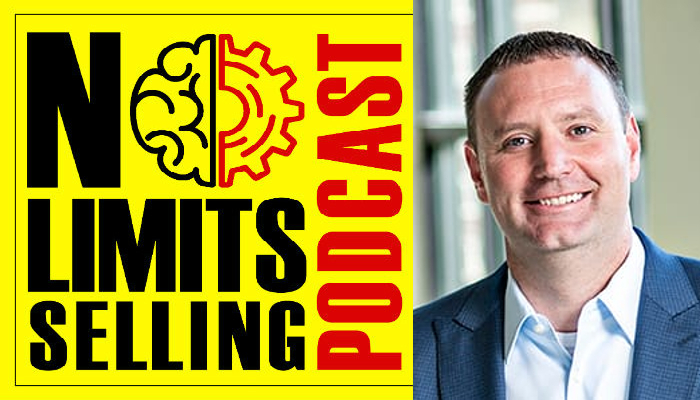How To Harness the Power of Dream Boards by Aaron Prickel
On Episode 129 of The No Limits Selling Podcast, we have Aaron Prickel, Owner/President/Coach at Lushin, Inc. - Powered by Sandler Training. In this episode, Aaron Prickel shares with us how to harness the power of dream boards.
Following his advice, Aaron strives to lead by example and often arrives at the office before anyone else to take advantage of focused, productive time. A Lushin management consultant since 2007, Aaron acts as the glue that binds and strengthens the team’s collective talents.
As not only a sales trainer but a great resource, he encourages his clients to stay true to themselves and their missions, and he adapts his training style to best serve each individual. Aaron emphasizes understanding the underlying cause of business performance problems: belief, behavior, or technique. He aims to teach sales training clients the simplicity of effective solutions.
Winner of the 2015 Ball State Achievement Award from the Miller College of Business, Aaron spends his precious free time outdoors, usually cheering on his three kids in their respective sports competitions.
Prickel has also become a regular keynote speaker at conferences and workshops for organizations such as the American Marketing Association, American Council of Engineering Companies, USA Football, and the Association of Builders and Contractors where he’s talked about such topics as breaking rules to sell more, enhancing a sales infrastructure and how to gain a competitive edge in the marketplace.

Contact Aaron:
[EDITOR’S NOTE: This podcast is sponsored by No Limits Selling. It is a fun, fast-paced podcast that delivers hard-fought business advice that you can implement today to improve your sales and performance]
Interested In Our Real Estate Coaching Services? Explore Our Website: Link
Feeling Not Well Today? You Can Use Our Mindset Boosters App To amp Up Your Mood: Link
Find us on Social Media:
LinkedIn | Facebook community | Instagram
Like what do you listen to? Subscribe to our podcast!
Ready to become fearless? We can help you become fearless in 60 days so you accomplish more in your career Schedule A 15 min Call with Umar
Summary
Introduction and Welcome
The podcast begins with the host, Umar Hameed, welcoming the listeners and introducing the guest, Aaron Prickel. Aaron is described as a sales guru who helps people increase their sales, which is crucial for growing businesses and ideas.
The Importance of Selling
The conversation starts with the acknowledgment that selling will always be a fundamental part of business, regardless of the tools or technology available. The ability to sell ideas effectively is what counts at the end of the day.
Sales Professionals Playing Defense
Aaron notes a recent trend among sales professionals playing defense, meaning they often find themselves justifying, defending, and explaining their positions. They handle problems that aren't necessarily theirs and jump through unnecessary hoops. This defensive stance is seen as a hindrance to their performance.
The Power of Social Proof and Peer Groups
The discussion moves on to the power of social proof and the influence of peer groups. Humans are described as pack animals, and the influence of our peers can be a powerful motivator. The continual gathering of one's tribe and helping each other get better is seen as a key to success.
The Role of Dream Boards
Aaron shares the importance of dream boards within their organization. These boards are filled with pictures of experiences they aim to encounter within the next year. They serve as daily reminders of what's truly important in life and why they do what they do. This visual representation helps to reframe the mindset and condition the mind toward achieving these goals.
Conclusion
In this podcast, Aaron Prickel, a sales guru, shares his insights on the importance of selling for business growth, the current trend of sales professionals playing defense, and the power of social proof and peer groups. He also discusses the role of dream boards in goal visualization and achievement. Despite the challenges in the sales industry, Aaron emphasizes the need for salespeople to stay true to themselves, understand their clients, and continuously adapt their strategies.
He believes in the power of understanding the root cause of business performance issues and implementing effective solutions. His teachings extend beyond the professional realm, encouraging a balanced life that includes personal passions and family.
Questions & Answers
What is the role of selling in business growth?
What does it mean for sales professionals to play defense?
How does social proof influence sales?
What is a dream board and how does it aid in goal achievement?
How does Aaron Prickel approach sales training?
What are some key takeaways from Aaron Prickel's podcast?
Don’t miss this opportunity to transform your real estate career with one-on-one coaching. As an experienced real estate coach, I, Umar Hameed, am dedicated to helping you unlock your full potential and achieve your real estate goals. To learn more about who am I and my clients ↓
If you’re ready to take the next step, book an appointment with me today and begin your journey toward success in the real estate industry.
